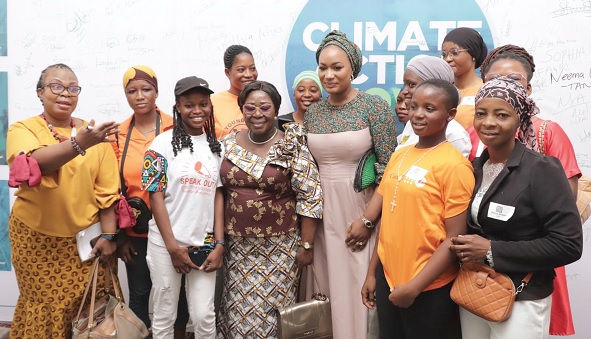
Jubilee House goes solar
The seat of the presidency, the Jubilee House, is rolling out a plan for boosting clean energy supply to ensure 60 per cent of its energy consumption is supplied through solar by the end of 2023.
The move is the government’s commitment to improve energy efficiency and transitioning to clean energy, given the effects of climate change.
The Chief of Staff, Akosua Frema Osei Opare, who disclosed this at the closing ceremony of the African Women and Children Conference (AFRIWOCC) in Accra last Thursday, explained that the plan was further commitment to investing in renewable energy resources such as solar, wind and hydro power to reduce the reliance on fossil fuels and their detrimental impact on the environment.
Conference
The maiden edition of AFRIWOCC was on the theme: “Amplifying the voices of women and children in climate action”.
An initiative of the Samira Empowerment and Humanitarian Projects (SEHP) under the auspices of the Office of the President, the two-day conference attracted approximately 450 participants from across Africa who joined either in-person or virtually.
Apart from President Nana Addo Dankwa Akufo-Addo, the Vice-President of Liberia, Jewel Taylor; the Minister for Women, Youth and Persons with Disabilities of South Africa and Former Chairperson of the African Union, Nkosazana Olamini Zuma, other participants included ministers of state from a number of African countries, parliamentarians, academia, development partners, civil society, private sector and traditional authorities.
The youth were represented by students and children from various educational institutions and climate advocacy organisations.
What needs to be done
Speaking on a sub theme, “Activating policy in the climate change economy”, Mrs Frema Osei Opare said managing climate change, which was a complex, structured and highly complicated global crisis, demanded requisite governance and policy interventions to break the business as usual governance approach.
Ghana, she said, was committed to the well-being of its people and had developed a number of climate change related policies, including the National Climate Change Master Plan Action Programmes for implementation and Reducing Emissions from Deforestation and Forest Degradation Strategy (REDD+).
The increasing number of policies, she said, was to translate the nation’s aspirations into tangible results and to save the planet and ensure a sustainable economy.
“By doing so we do not only mitigate risk of climate change, but also create new opportunities for green jobs and sustainable economic development,” she said.
Activation of policies in the climate change economy, the chief of staff said, required a multifaceted approach which must begin with a comprehensive state collaboration.
“We must work hand in hand with scientists, environmentalists, business leaders and civil society to develop and implement effective policies that promote green energy, protect our natural resources and foster green technologies,” she said.
Key issues
Some of the key issues highlighted on climate action for women and children included the inadequate institutional capacity, high levels of gender inequality, low levels of technology usage and technical knowledge that worsen the impact of climate change in Africa, particularly for women and children.
It was also indicated that the climate crisis had widespread repercussions that left women and children, particularly vulnerable to food insecurity and malnutrition, with adverse health outcomes, conflict and increased their exposure to violence.
Narrative must change
During panel discussions, the discussants indicated that the narrative on climate action must change from problem-based to identifying and seizing opportunities for innovation, creative solutions, education and empowerment.
Also, they indicated that conscious and intentional efforts must be made to create spaces for the voices of African women and children to be heard in climate discussions at local, national and international levels.
Financing for green initiatives was found to exist but was not readily accessible to women and youth who could be climate change agents, while the lack of education on climate issues, as well as limited opportunities to build the capacities of women, youth and children in climate mitigation efforts was slowing Africa’s progress in combating climate change.
Climate change, the participants said, was increasingly inducing migration and heightening political insecurity threats across the sub-region and further impacting economic stability especially of women and children.
The conference also highlighted that Africa’s youthful population in the median age 19 years represented both an opportunity for demographic dividends, as well as a challenge to social cohesion if the right investments were not made now.
